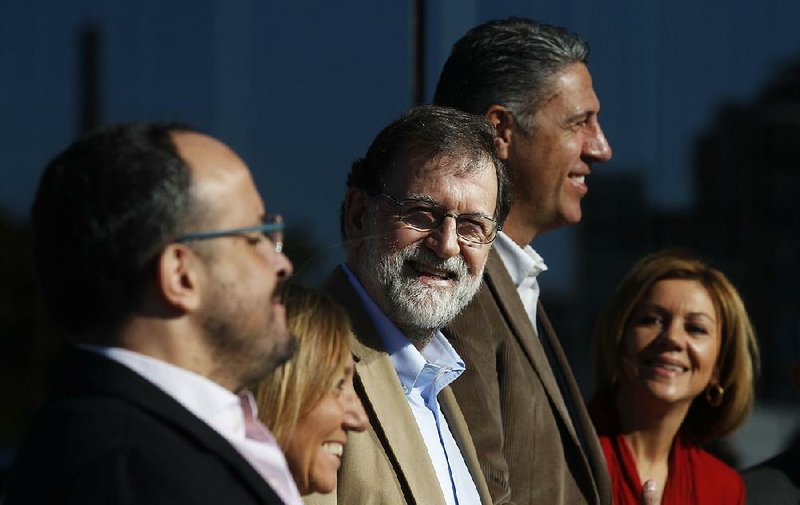BARCELONA, Spain -- Spanish Prime Minister Mariano Rajoy urged voters in Catalonia on Sunday to defeat the separatists who led the region's recent drive for independence when they go to the polls in an early election next month.
Rajoy, who used previously untapped constitutional authority to call the Dec. 21 regional election, told members of his conservative Popular Party at a Barcelona hotel that "we want a massive turnout to open up a new period of normalcy" in Catalonia.
Rajoy's visit to Barcelona, Catalonia's main city, was his first to the region since he used the constitutional powers to stifle the secession push led by the regional government.
After Catalonia's Parliament voted Oct. 27 in favor of declaring independence, Rajoy responded by firing top government officials, dissolving the Parliament and ordering the early election.
Spain's Constitution says the nation is "indivisible."
"It's urgent to return a sense of normality to Catalonia and do so as soon as possible to lower the social and economic tensions," Rajoy said Sunday. "The threat of the separatists is destructive, sad and agonizing. Secessionism has created insecurity and uncertainty."
In Brussels on Sunday, those favoring independence for Catalonia rallied near the European Union quarter.
Rajoy's party has won three national elections since 2011, but secured less than 10 percent of the vote in Catalonia's 2015 regional election.
The far-left separatist CUP party decided Sunday to participate in the December elections. The CUP is one of three pro-secession parties in the region.
Rajoy defended his decision to temporarily take over running Catalonia under a section of the Spanish Constitution that allows central authorities to intervene in regions where officials act outside the law.
Catalonia's separatists, and even some moderates, have criticized the measures as heavy-handed.
"Exceptional measures can only be taken when there is no other option, and we adopted them to stop the increasing attacks to peaceful coexistence," Rajoy said.
But before the December elections, the independence movement has shown signs of strain. Ousted Catalan President Carles Puigdemont failed last week to strike an agreement between the two main Catalan parties to renew the joint, pro-independence ticket that brought them into office in late 2015.
On Sunday, the representatives of the far-left party of Ada Colau, mayor of Barcelona, voted to break up their governing coalition in Barcelona's City Hall with the Socialists, because the Socialists had backed Rajoy's decision to take over Catalonia's administration.
In response, Miquel Iceta, the Socialist leader in Catalonia, accused Colau's party of choosing Catalan independence over the interests of Barcelona.
On Twitter, Colau called the breakup of her governing coalition Sunday "a difficult decision." She recently had criticized the separatist lawmakers for unilaterally declaring independence.
Apart from the government takeover, 10 Catalan separatist leaders have been jailed while their roles in promoting secession are under investigation. Catalonia's deposed president and four former members of his Cabinet fled to Brussels and plan to fight extradition to Spain.
Rajoy linked the continued economic recovery of Spain, and especially Catalonia, to the removal of pro-independence parties from power.
Rajoy urged Spanish consumers not to boycott Catalan goods and said that he was determined to stop separatists from pursuing "a journey to nowhere, that will again bring crisis, unemployment and the fracture of Catalan society."
Over 2,000 companies have relocated their headquarters from Catalonia due to fears of being cast out of the European Union's common market in the case of secession. Employment numbers also showed that Catalonia fell behind other parts of Spain in October.
"But I say that the recovery of legality and normalcy will help reactivate the economy," the prime minister said.
Information for this article was contributed by Joseph Wilson of The Associated Press and by Raphael Minder of The New York Times.
A Section on 11/13/2017
